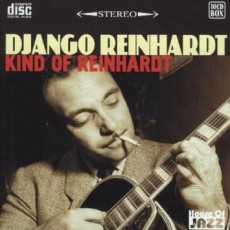
Daily Dose Of Jazz…
Jean Reinhardt better known as “Django” was born on January 23, 1910 in Liberchies, Pont-a-Celles, Belgium into a French family of Manouche Romani descent. His family made cane furniture for a living but it was comprised of several good amateur musicians. He spent most of his youth in Romani encampments close to Paris, where he started playing violin, banjo and guitar.
Reinhardt was attracted to music at an early age, first playing the violin. At age 12, he received a banjo-guitar as a gift and quickly learned to play by mimicking the fingerings of musicians he watched. By age 13, Reinhardt was able to make a living playing music. He received little formal education and acquired the rudiments of literacy only in adult life. His first known recordings, made in 1928, were of him playing the banjo.
At age 18 in 1928 Reinhardt was injured in a fire started by a knocked over candle. Over half his body suffered burns, two fingers and one leg were paralyzed and it was thought he would never walk or play again. But with therapy and practice he re-learned to play differently and walked with a cane.
The years between 1929 and 1933 were formative musically for Django when he became attracted to jazz listening to Louis Armstrong. Shortly thereafter he met Stephane Grappelli who had similar interests. The two became musical partners. In 1934, with an invitation by Hot Club de France secretary Pierre Nourry, he and Grappelli formed the Quintette du Hot Club de France. Over the years it hosted different players and adding a singer but for the most part allowed only stringed instruments.
In 1933, Reinhardt recorded two takes each of vocal numbers “Parce-que je vous aime” and “Si, j’aime Suzy”, continued to record into 1934, and in 1935 he and Stephane recorded sides for Decca Records. He played and recorded with Adelaide Hall, Coleman Hawkins, Benny Carter, Rex Stewart, Louis Armstrong, Dizzy Gillespie, and Duke Ellington.
By 1946, he was debuting at the Cleveland Music Hall as a special guest soloist with Duke Ellington and His Orchestra. As part of the U.S. tour Django also played two nights at Carnegie Hall, then secured an engagement at Café Society Uptown, where he played four solos a day, backed by the resident band drawing large audiences.
Returning to France in ’47, Reinhardt became re-immersed in Gypsy life, finding it difficult to adjust to the postwar world. Missing sold-out concerts, showing up without guitar or amplifier and wandering off were commonplace. However, during this period he continued to attend the R-26 artistic salon in Montmartre, improvising with his devoted collaborator, Stéphane Grappelli.
From 1951 until his death at age 43 on May 16, 1953 of a brain hemorrhage, Reinhardt retired to Samois-sur-Seine near Fontainbleau. He had continued to play in Paris jazz clubs and began playing electric guitar. (He often used a Selmer fitted with an electric pickup, despite his initial hesitation about the instrument.) His final recordings made with his “Nouvelle Quintette” in the last few months of his life show him moving in a new musical direction; he had assimilated the vocabulary of bebop and fused it with his own melodic style.
More Posts: guitar


